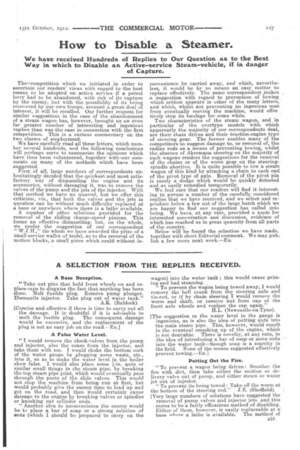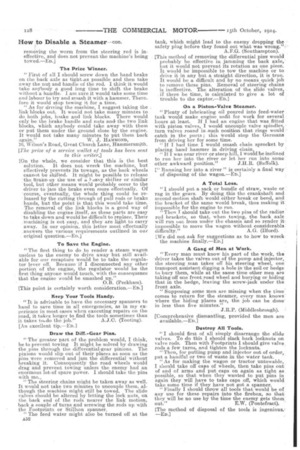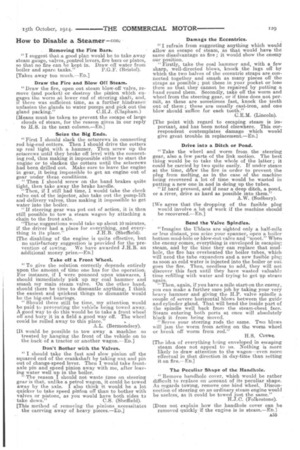A SELECTION FROM THE REPLIES RECEIVED.
Page 17

Page 18

Page 19

If you've noticed an error in this article please click here to report it so we can fix it.
A Base Deception.
"Take out pins that hold front wheels on and replace caps to disguise the fact that anything has been done. Melt fusible plug. Remove pump plunger. Dismantle injector. Take plug out of water tank." A.K. (Baldoek). [Concise and effective if there is time to carry out all the damage. It is doubtful if it is advisable to melt the fusible plug. The consequent damage would be excessive, and the replacement of the plug is not an easy job on. the road.—En] • A False Water Level.
" I would remove the check-valves from the pump and injector, also the cones from the injector, and take them with me. I would choke the bottom cock of the water gauge by plugging some waste, etc., into it, so as to make the water level in the boiler
show false. I would also place some nuts or similar small things in the steam pipe, by breaking the top steam pipe joint, which would eventually pass through the ports of the slide valves. This would not stop the machine from being run at first, but would probably give the enemy time to lead up and get on the road, and then would certainly cause. damage to the engine by breaking valves or spindles or knocking out cylinder ends. " Another idea to inconvenience the enemy would be to place a bar of soap or astrong solution of soda (which I should ho prepared to carry on the wagon) into the water tank ; this would cause priming and bad steaming. . To prevent the wagon being towed away, I would remove the bell crank from the steering axle and tie-rod, or if by chain steering I would remove the worm and shaft, or remove nut from one of the front axle wheels and replace the cap again." ILL. (Newcastle-on-Tyne).
[The suggestion re the water level in the gauge is ingenious, as is also the idea. of putting nuts into the main steam pipe. This, however, would result in the eventual smashing up of the engine, which is not desirable. There is novelty, at any rate, in the idea of introducing a bar of soap or some soda into the water tank—though soap is a scarcity in the field. None of the means suggested effectively prevent towing—ED.] Putting Out the Fire.
"To prevent a wagon being driven : Smother the fire with dirt, then take either the suction or delivery valve out of pump, and either steam or water jet out of injector. "To prevent its being towed : Take off the worm at the bottom of the steering rod." J.E. (Sheffield). [Very large numbers of solutions have suggested the removal of pump valves and injector jets and this seems to be a fairly efficacious method of disabling. Either of them, however, is easily replaceable at a, base where a lathe is available. The method of A51 removing the worm from the steering red is ineffective, and does not prevent the machine's being towed,—ED.1 The Prize Winner.
"First of all I should screw down the band brake on the back axle as tight as passible and then take away the nut, and handle of the rod. I think it. would take anroodY A good long time to shift the brake without a handle. I am sure it would take some time and labour to try and smash it with a hammer. Therc. fore it would stop towing it for a time. " As for driving the machine, I suggest taking the link blocks out. It would not take many minutes to do both jobs, baake and link blocks. There would only be the brake handle and nuts ani3 the two link blocks, which anybody could take away with them or put them under the ground close by the engine. It would not take many minutes to put them back
again!' W. J. HA1VIMOND, 16, Wilson's Road, Great Church Lane, Hammersmith.
[The prize of a service wallet of tools has been sent to this writer,] [On the whole, we consider that this is the best
solution. It does not wreck the machine, but effectively prevents its towage, as the back wheels cannot be shifted. It might be possible to release the Drake, oy the use of a heavy shifter or similar tool, but other means would probably occur to the driver to jam the brake even more effectually. Of -course, eventually, the whole thing could be re
• leased by the cutting through of pull rods or brake bands, but the point is that this would take time. The removal of the link blocks is a good way of disabling the engine itself, as these parts are easy • to take down and would be difficult to replace. Their . machining is not easy, and they are light to carry away. In our opinion, this letter most effectually answers the various requirements outlined in one original question.—En.] To Save the Engine.
"The first thing to do to render a steam wagon useless to the enemy to drive away but still available for our recapture would be to take the regulator lever off. Because-if I disconnected any other portion of the engine, the regulator would be the first thing anyone would touch, with the consequence that the engine would be smashed U73." 0.h. (Peckham).
[This point is certainly worth consideration.—ED.] Keep Your Tools Handy.
"It is advisable to have the necessary spanners to hand to save time in all emergencies, as in my experience in most cases when executing repairs on the road, it takes longer to find the tools sometimes than it takes toed° the job!' A. J". C. (Tooting), [An excellent tip.—En.]
Draw the Dill. -Gear Pins.
"The' greater part of the problem would, I think, be to prevent towing It might be solved by drawing the pins through the differential-gear pinions. The pillions would slip out of their places as soon as the pins were removed and jam the differential without breaking it. Consequently the road wheels would drag and, prevent towing unless the enemy had an enormous lot.of spare power. I should take the pins With me., "The steering chains might be taken away as well. It would not take two minutes to uncouple them, although the machine might still be towed. The slide Valves should be altered by letting the lock nuts, on. the back end of the rods nearer the link motion, back a couple of turns and screwing the rods up with the Footprints or Stillson spanner. "The feed water might also be turned off at the A52 tank, which might lead to the enemy dropping the safety plug before they found out what was wrong." A. E.G. (Southampton).
[This method of removing the differential pins would probably be effective in jamming the back axle,' but it would not prevent its rotation as one piece. It would be impossible to tow the machine or to drive it in any but a straight direction, it is true. It would be a difficult and by no means quick job to remove these pins. Removal of steering chains is ineffective. The alteration of the slide valves, if there be time, is calculated to give a lot of trouble to the captor.—En.]
On a Piston-Valve Steamer.
"Plenty of lubricating oil poured into feed-water tank would make engine unfit for work for several hours at least. If I had an engine that was fitted with piston valves, I would uncouple valve spindles, turn valves round in -Ruch position that rings would catch in the ports ; this would stop the Germans from driving her for some time. " If I had time I would smash chain sprocket by placing hand hammer in driving chain, "If I was near river or steep hill, I would T3e inclined to run her into the river or let her run into some other awkward position." J.H.R. (Suffolk).
I:" Running her into a river" is certainly a final way of disposing of the wagon.—En.] A Total Loss.
"I should put a sack or bundle of straw, waste or rag in the gears. By doing this the crankshaft and second-motion shaft would either break or bend, and the bracket of the same would break, thus making it impossible for the engine to run. "Then J should take out the two pins of the radius rod brackets, so that, when towing, the back axle will run out from under the chassis and so render it. impossible to move the wagon without considerable difficulty." A.G. (Ilford). [We did not ask for suggestions as to how to wreck the machine finally.—En.] A Gang of Men at Work.
"Every man must know his part of the work, the • driver takes the valves out of the pump and injector, the steering man takes off his steering wheel, one transport assistant digging a hole in the soil or hedge to bury them, while at the same time other men are taking off one front road wheel and burying or hiding that in the hedge, leaving the screw-jack under the front axle.
"Supposing some men are missing when the time comes to return for the steamer, every man knows ' where the hiding places are, the job can be done in less than five minutes."
J.R.P. (Middlesbrough). 2 [Comprehensive dismantling, provided the men are Destroy All Tools.
"I should first of all simply disarrange the slide valves. To do this I should slack back locknuts on valve rods. Then with Footprints I should give valve rods a few turns, and tighten the locknuts. "Then, for putting pump and injector out of order, put a handful or two of waste in the water tank.
"As for making the wagon or tractor untowable, I should take off caps of wheels, then take pins out of end of arms and put caps on again as tight as possible, so that when they wanted to put pins in again they will have to take caps off, which would take some time if they have not got a spanner. "Finally I should throw all tools that would be of any use for these repairs into the firebox, so that they will be no use by the time the enemy gets them out." E.W. (Pontefract).
[The method of disposal of the tools is ingenious.' —En.] Removing the Fire Bars.
"I suggest that a good plan would be to take away steam gauge, valves, control levers, fire bars or plates, so that no fire can be kept in. Draw off water from
boiler and spare tanks." P.G.F. (Bristol).
[Takes away too rnuch.—En.] Draw the Fire and Blow 012 Steam.
"Draw the fire, open out steam blaw-off valve, remove (and pocket) or destroy the pinion which engages the worm at lower end of steering shaft, and, if there was sufficient time, as a further hindrance unfasten the glands to water pumps and pick out the gland packing." C.H.J. (Clapham.) [Means must be taken to prevent the escape of large clouds of steam, for the reason given in our reply to H.S. in the next. column.—Eal
Seize the Big Ends.
" First I should slaek the setscrews in connecting rod big-end cotters. Then. I should drive the cotters up real tight with a hammer. Then screw up the setscrews until they broke off level with the connecting rod, thus making it impossible either to start the engine or to slacken the cotters until the setscrews had been drilled out. Make sure to leave the engine in gear, it being impossible to get an engine out of gear under these conditions. "Then I should screw on the band brakes quite tight, then take away the brake handle.
"Then, if I still had time, I would take the cheek valve out of the injector, also take out the pump-lift and delivery valves, thus making it impossible to get water into the boiler.
"If steering gear was put out of action, it is then still possible to tow a steam wagon by attaching a chain to the front axle.
"These suggestions would take up about 10 minutes, if the driver had a place for everything, and every thing in its place!' J.H.B. (Sheffield).
[The disabling of the engine is quite effective, but no satisfactory suggestion is provided for the prevention of towing. We have awarded J.H.B. an additional money prize—ED.] Take off a Front Wheel.
" To give the solution. correctly depends entirely upon the amount of time one has for the operation. For instance, if I were pounced upon unawares, I should immediately pick up my coal hammer and smash my main steam valve. On the other hand, should there be time to dismantle anything, I think the easiest and quickest things to dismantle would be the big-end bearings.
" Should there still be time, my attention would be paid to preventing the vehicle being towed away. A good way to do this would be to take a front wheel off and bury it in a field a good way off. The wheel could be rolled away to this place."
A.L. (Bermondsey).
[It would be possible to tow away a machine so treated by hanging the front of the vehicle on to the back of a tractor or another wagon.—En.] Don't Bother with the Valves.
" I should take the fast and slow pinion off the squared end of the crankshaft by taking nut and pin out of change-speed lever. Then I would take frontaxle pin and speed pinion away with me, after leaving water well up in the boiler.
The reason I should not waste tune on steering gear is that, unlike a petrol wagon, it could be towed away by the axle. I also think it would be a lot quicker to take speed pinion off than to bother with valves or pistons, as you would have both sides to take down."
C.S. (Sheffield).
[This method of removing the :pinions necessitates the carrying away of heavy pieces F. ] Damage the Eccentrics.
"I refrain from suggesting 'anything which watild allow an escape of steam, as that would have the same disadvantage as fire ; it would show the enemy our position.
"Firstly, take the coal hammer and, with a few sharp, well-directed blows, knock the lugs oft by which the two halves of the eccentric straps are connected together and smash as many pieces off the straps as possible ; put these in your pocket or lose them so that they cannot be repaired by putting a band round them. Secondly, take off the worm and wheel from the steering gear, or if time does not permit, as these are sometimes fast, knock the teeth out of them ; these are usually cast-iron, and one blow should suffice for each tooth."
C.E.M. (Lincoln).
[The point with regard to escaping steam is important, and has been noted elsewhere. This correspondent contemplates damage which would give great trouble in replacement—En.] Drive into a Ditch or Pond.
"Take the wheel and worm from the steering gear, also a few parts of the link motion. The best thing would be to take the whole of the latter ; it could be carried by two quite easily. If under steam at the time, Vaw the fire in order to prevent the plug from melting, as in the ease of the machine being recovered a lot of time would be wasted in putting a new one in and in doing up the tubes.
"If hard pressed, and if near a deep ditch, a pond, or a river, drive as hard as possible into them.' A.W. (Sudbury).
1.-We agree that the dropping of the fusible plug would involve a lot of work if the machine should be recovered.—Eni Bend the Valve Spindles.
"Imagine the 1.Thlans are sighted only a half-mile or less distant, you seize your spanner, open a boiler bottom mud-hole or blow-out valve and "scoot." When the enemy comes, everything is enveloped in escaping steam, and by the-time they can replace that mudhole, the fire has overheated the boiler tubes, which will need the tube expanders and a new fusible plug as soon as cold water is injected into the boiler or out goes the fire. Then, needless to add, they will not discover this fact until they have wasted valuable time refilling with water and trying to get up steam again.
" Then, again, if you have a mile start. on the enemy, you can make a further sure job by taking your very heavy hammer and giving the H.P. valve spindle a couple of severe horizontal blows between the guide and cylinder gland. That will bend the inside part of the spindle well back from the steam-chest face. Steam entering bath ports at once will absolutely block it from being moved.
" Serve your steering rods the same. Two blows will jam the worm from acting on the worm wheel or break off worm from rod.'' H.S. Crewe_ [The idea of everything being enveloped in escaping steam does not appeal to us. Nothing is more likely to draw attention to the wagon—even more effectual in that direction in day-time than setting it on fire.—En.] The Peculiar Shape of the Handhole.
" Remove handhole cover, which would be rather difficult to replace on account of its peculiar shape. As regards towing, remove one hind wheel. Disconnection of steering on an ordinary steam engine would be useless, as it could be towed just the same." H.J.C. (Folkestone).
[Does not explain how the handhole cover can be removed quickly if the engine is in steam.—En.]






















